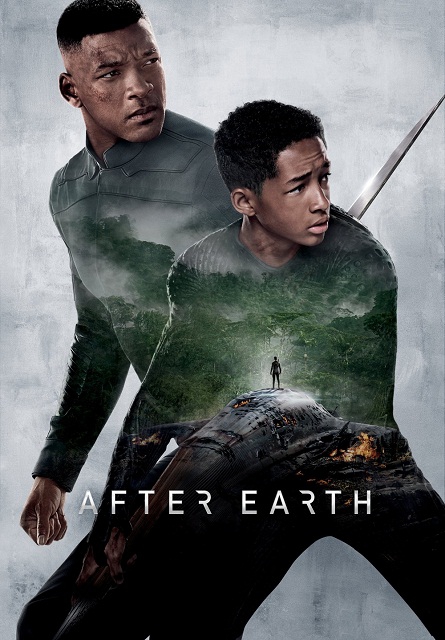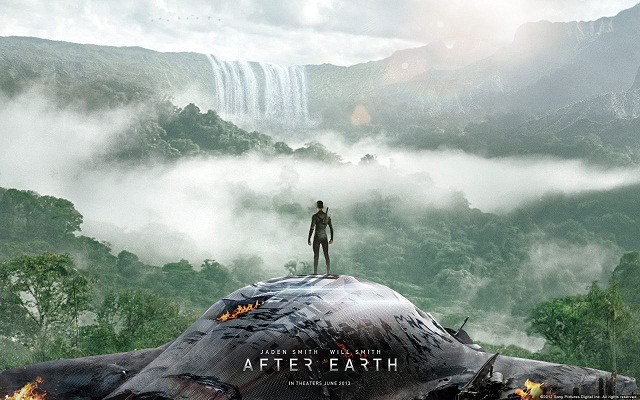Filtered By: Lifestyle
Lifestyle
Movie review: Nepotism is real. 'After Earth' is a choice.
By Mikhail Lecaros
M. Night Shyamalan just can’t stop.
Fourteen years after his directorial effort “The Sixth Sense” shot him to critical acclaim and box office success, the man is the very definition of a Hollywood has-been. Take, for instance, his once-fascinating affinity for the supernatural, combined with his predilection for third act plot twists. After “The Sixth Sense” proved to be box office gold, these attributes would, in one form or another, appear in virtually all his subsequent films, albeit to increasingly diminishing returns.

Columbia Pictures
Even a last-ditch stab at blockbuster filmmaking, his live action adaptation of animated smash “Avatar: The Last Airbender,” couldn’t save the former wunderkind’s reputation, much less his career. As a film, “Airbender” was a lifeless product that saw fit to throw out or change most of the things that made the source material popular. Sure, it made money off the strength of the show’s fan base, but for all intents and purposes, Shyamalan’s heyday as a purveyor of shock and mystery was pretty much over.
Which brings us to the Will and Jayden Smith starrer “After Earth”, a film so devoid of common sense and purpose (save for nepotism), it nearly reaches “Enteng Kabisote” levels of banality (and, come to think of it, nepotism).
The premise, credited to Will Smith, isn’t half bad. The film begins with a generic expository narration filling us in on how humanity abandoned Earth 1,000 years ago. In Man’s absence, the flora and fauna left behind was somehow able to evolve to the point of becoming deadly to the planet’s former masters.

Columbia Pictures
The promising start quickly betrays the viewer’s interest by revealing itself to be a plodding, by-the-numbers father-son reconciliation tale where, over the course of an adventure, they discover things about themselves (and each other) that inevitably ends with them hugging (and saluting, in this case).
While no one at this point was expecting anything from Shyamalan, a lot was expected from Will Smith. After all, not many people can make the claim of being talented and charismatic enough to have made the transition from rapper to movie star (“Independence Day”, “Men in Black”) to respectable actor (“Ali”, “The Pursuit of Happyness”). Even Will’s first foray into producing a vehicle for son Jaden, 2010’s “The Karate Kid” remake, was much better than it had any right to be. Unfortunately, with “After Earth”, the former Fresh Prince may have bitten off more than he could chew.
Using Hollywood clout to create starring vehicles for one’s offspring is nothing new, but not since Sophia Coppola’s wooden turn in “The Godfather: Part Three” has it been so outright painful to watch. Where Jaden was precocious – even charming – as a budding martial artist in “The Karate Kid,” it is truly sad that his most memorable moment here is when his face swells up into an almost-perfect replica of his father’s allergy-swollen mug in “Hitch.”
For his part, the elder Smith tries his best, but even the (formerly) biggest movie star in the world can’t rise above the flat direction and occasionally shoddy visual effects, to say nothing of the uneven production design that somehow makes bio-infused technology look cheap. Smith’s approach to playing a hardened general is to scowl throughout the entire film and spout dialogue – which consists mainly of recruitment slogans (“Danger is real. Fear is a choice.”) and motivational statements – in a monotone.
And what of the accents sported by father and son that had viewers of the trailer scratching their heads? Heaven only knows what they were thinking, but whatever influences future syntax and inflection will be derived from, post-colonial European probably won’t be on the list.
“After Earth” is a prime example of a missed opportunity that brings nothing new to the roster of post-apocalyptic science fiction adventure films. For better father-child genre tales of survival, moviegoers would be better served with “The Road,” or, better yet, Alfonso Cuarón’s superlative “Children of Men.”
I doubt this is the last we’ll hear from the Smiths; the pair is too talented and charismatic to let one flop mar their careers. As for director M. Night Shyamalan, though, something’s gotta give, because coasting on the success of a fourteen-year-old Bruce Willis movie is kind of embarrassing. If we’re extraordinarily lucky, maybe “After Earth” will be the nail in the coffin that finally makes Shyamalan put aside his directorial delusions and move on to an industry that won’t have people wondering where two hours of their lives went.
Food service or housekeeping, perhaps? – YA, GMA News
Tags: afterearth, movieafterearth
More Videos
Most Popular



